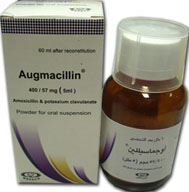
Augmacillin® 400/57
Augmacillin® 200/28.5
Composition:
Each 5 ml contains:
Amoxycillin trihydrate 200 mg
Clavulanic Acid 28.5 mg
Or : Each 5ml contains :
Amoxycillin trihydrate 400 mg
Clavulanic Acid 57 mg
Pharmacological action:
Augmacillin is a formulation of amoxycillin, a bactericidal broad spectrum
penicillin and potassium clavulanate a progressive and irreversible inhibitor of
B-Iactamase enzymes. The presence of potassium clavulanate protects
amoxycillin from destruction and subsequent loss of antibacterial activity by the B- lactamase enzymes produced by many Gram-negative and Grarm- positive bacteria. The spectrum of amoxycillin is thus widened to include organisms normally resistant by venue of their ability to produce B- lactamase.
Augmacillin will not only eliminate primary pathogens but also will not be
inactivated by non pathogenic B- lactamase producing organisms at the site of
infection. Augmacillin is bactericidal to a wide range of Gram-positive and Gram-negative bacteria including many clinically important B- lactamase producing penicillin resistant organisms. Augmacillin is well absorbed from G.I.T and not affected by the presence of food at the time of oral intake.
50%- 70% of amoxicillin and 25%-40% of clavulanic acid is excreted in urine in
its original form within 6 hours of intake, the rest is well distributed in the
tissues.
Indications:
Augmacillin is indicated for the treatment of common bacterial infections where antibiotic therapy is indicated. Including:
– Upper Respiratory Tract Infections: Sinusitis, tonsillitis, otitis media
– Lower Respiratory Tract Infections: Acute and chronic bronchitis, lobar and bronchopneumonia, empyema, lung abscess
– Skin and Soft Tissue Infections: Boils/abscesses, cellulitis, wound infections, intra-abdominal sepsis.
– Genito-Urinary Tract Infections: As cystitis, urethritis, pyelonephritis,
septic abortion, puerperal sepsis, pelvic infections, chancroid and gonorrhoea.
– Other infections: As osteomyelitis, septicaemia, peritonitis, post-operative
infections.
Dose:
– Children 7-12 years: 7 ml Augmacillin 228.5mg syrup three times a day
– Children 2- 7 years: 3.5ml Augmacillin 228.5mg syrup three times a day
– Children 9 months-2 years: 1.8 ml Augmacillin 228.5 mg syrup three times a
day
– In severe infections: these dosages may be doubled
– In cases of severe infections :5ml Augmacillin 457 mg three times a day
– Treatment with Augmacillin should not be extended beyond 14 days without
review.
Dosage In renal impairment:
Mild Impairment with Creatinine clearance >30mlfmin no change in dosage
Moderate Impairment Creatinine clearance 1030-ml/min 228.5457-mg/12 hours Severe Impairment Creatinine clearance < 10ml / min Not more than 228.5 mg 12 hourly
Contra-Indication:
Penicillin hypersensitivity.
Side Effects:
– Side effects, as with amoxycillin are uncommon and mainly of a mild and
transitory nature
– Diarrhoea, pseudomembranous colitis, indigestion, nausea, vomiting, and
candidiasis have been reported. Nausea, although uncommon, is more often
associated with higher oral dosages. If gastro-intestinal side effects occur with
oral therapy they may be reduced by taking Augmacillin at the start of meals.
– Urticarial and erythematous rashes sometimes occur but their incidence has
been particularly low in clinical trials. An urticarial rash suggests penicillin
hypersensitivity and treatment should be discontinued. Erythematous rashes
are frequently mild and transient but may be severe when associated with
infectious mononucleosis,. in which case treatment should be discontinued.
– Rare cases of erythema multiform, Stevens-Johnson syndrome and an
occasional case of exfoliative dermatitis have been reported.
– Serious and occasionally fatal hypersensitivity (anaphylactic) reactions and
angioneurotic oedema have been reported in patients on penicillin therapy
although anaphylaxis is more frequent following parenteral therapy, it has
occurred in patients taking oral penicillins. These reactions are more likely to
occur in individuals with a history of penicillin hypersensitivity and/or a history of sensitivity to multiple allergens.
– Hepatitis and cholestatic jaundice have been reported.
Pregnancy & Lactation:
– Aniffial studies with orally Augmacillin have shown no teratogenic effects.
The product has been used in human pregnancy in a limited number of
cases, with no untoward effect; however, use of Augmacillin in pregnancy is
not recommended unless considered essential by the physician.
– As with all drugs, therapy with Auqrnacillin during pregnancy should be
avoided if at all possible, especially during the first trimester.
– During lactation, trace quantities of penicillins can be detected in breast milk.
Precaution & Warnings:
Changes in liver function tests have been observed in some patients receiving
Augmacillin. The clinical significance of these changes is uncertain but
Augmacillin should be used with care in patients with evidence of severe hepatic dysfu nction. In patients with moderate or severe renal impairment Augmacillin dosage should be adjusted as recommended in the “Dosage” Section.
Package & Storage:
Bottle containing 60 ml after reconstitution
Store in a cool dry place at temp. not exceeding 30’C
Keep all medications out of reach of children
produced by :
Arab Co. For Pharmaceuticals & Medicinal Plants
MEPACO- EGYPT (Enshas El Raml- Sharkeiya)
